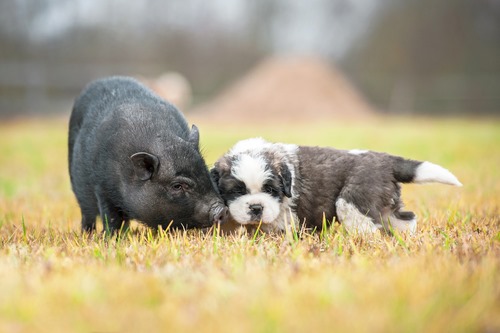Pigs Are Smart – and Machiavellian

Winston Churchill famously said: “A dog looks up to you; a cat looks down on you; only a pig treats you as an equal.”
But that, of course, is hardly how we treat them in return. Pigs are typically viewed as things to be born in cages and kept in cages until they’re ready to be processed into pork chops and sausages.
Two scientists have now concluded that pigs are indeed extraordinarily complex animals, and that they share many of the characteristics we admire in, for example, dogs, chimpanzees, dolphins and humans.
“We wanted to know what the science tells us,” said neuroscientist Dr. Lori Marino, co-author with Prof. Christina M. Colvin of a paper just published in the International Journal of Comparative Psychology. “Anyone who has a pig as a companion can tell you they’re very smart, but what exactly does that mean?”
So the two scientists reviewed dozens of individual studies of cognition, emotion, self-awareness, empathy, personality and social complexity among pigs.
One of their most interesting discoveries was that just as chimpanzees engage in tactical deception, so do pigs. Machiavellian intelligence, as it’s known, is the ability to look at a situation through the eyes of someone else – for example a competitor – and then plan a course of action based on that knowledge. So, I might head over one way in order to convey the impression that I’ve found some food over there, and when my fellow pig heads off in that direction, too, I double back the other way to where the food really is.
“This kind of cognitive deception is something we’ve really only seen in great apes.”“This kind of cognitive deception is something we’ve really only seen in great apes,” Dr. Marino said. “It relies on visual perspective taking and then modeling how the other animal is going to behave. And pigs do it, too.”
Another thing that fascinated the two scientists was that pigs can find hidden food using a mirror. If a piece of food is placed out of sight behind a barrier, but the pigs can see it through a mirror, they understand what that means and they know exactly where the food really is.
“That’s particularly interesting, Dr. Marino said, “Because in order to do that the pig needs to have a sense of his own body and how it relates to what is in the mirror. In one study some of the pigs showed what we call contingency checking behavior. That’s when you check yourself out in mirror, and it’s something we’ve only seen in great apes, elephants, and certain dolphins and birds.”
 “We’d really like to see a full mirror self-recognition study conducted with pigs so that we can learn more about their level of self-awareness,” Dr. Marino said.
“We’d really like to see a full mirror self-recognition study conducted with pigs so that we can learn more about their level of self-awareness,” Dr. Marino said.
Pigs have also been shown to understand how to use a joystick – again something that’s only been seen in great apes. In this case, it involves an understanding that the joystick represents the cursor on the computer screen.
“It’s the kind of task that involves self-agency,” Dr. Marino explained. “In other words, you’re doing something that achieves something else that’s not directly connected with you.”
Self-agency is also related to an understanding of the use of symbols and, by extension, language, whereby a sign or a group of letters on a page represents something else altogether, like an object or a thought.
“Overall, this paper shows that pigs share a number of cognitive capacities with other highly intelligent species,” Dr. Marino said. “There is now good scientific evidence to suggest we need to rethink our overall relationship to them.”
The paper itself is part of “Someone not Something”, a project of Farm Sanctuary and The Kimmela Center for Animal Advocacy (of which Dr. Marino is the founder and executive director). Co-author Christina M. Colvin is a professor of English who specializes in animal studies. The two authors recommend some compelling areas that need to be followed up in non-invasive research on pigs.
“We need a better understanding of who these animals are,” Dr. Marino said, “so we can develop a more enlightened relationship to them.”
The paper “Thinking Pigs: A Comparative Review of Cognition, Emotion, and Personality in Sus domesticus” is published in the International Journal of Comparative Psychology and is available here.
